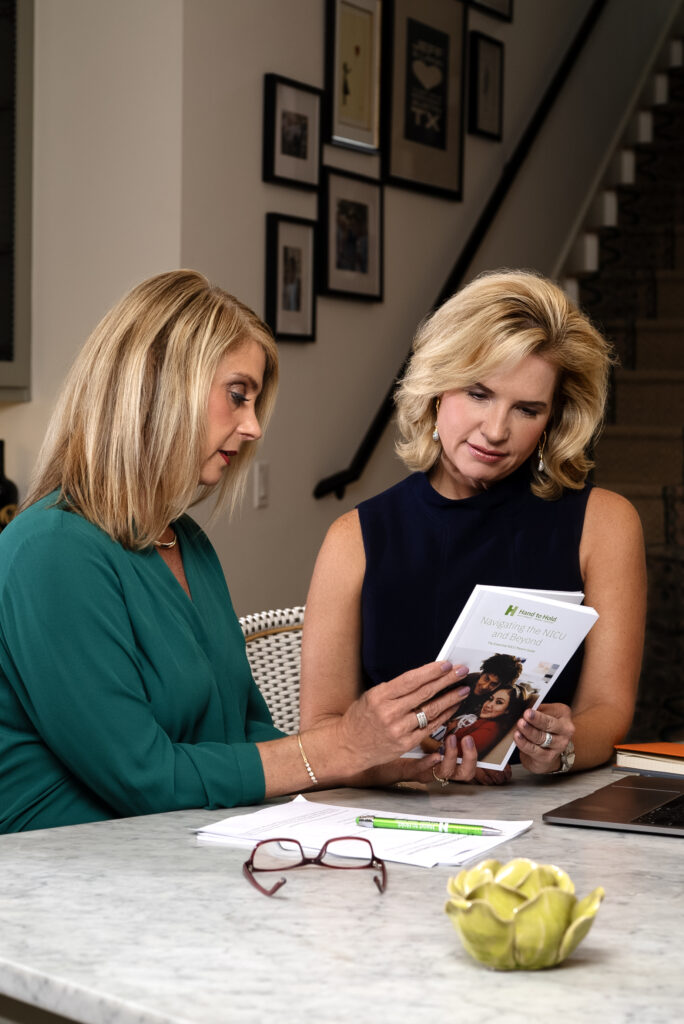Nonprofit, Hand to Hold, offers support to the parents who are often forgotten.
By Andrea Ramsay
Photos by Romina Olson

In the neonatal intensive care unit (NICU), all eyes are on the baby in need – as they should be. Precious life is at stake. But behind every life being cared for in the NICU is another life, just as precious but often forgotten: the mother.
Mothers of babies who spend time in the NICU have a 20-30% higher prevalence of perinatal mood and anxiety disorders (PMADs), according to the Journal of Perinatology. One in seven babies born in Austin will spend time in the NICU. Despite this prevalence and the growing awareness around maternal mental health, the mental health needs of a NICU mom are often misunderstood and underestimated. Help can be difficult to find and afford. Austin-based non-profit Hand to Hold is working to fill this gap by providing free mental health and peer support services for NICU families.
Founder and CEO Kelli Kelley started Hand to Hold in 2010 after two NICU experiences with her children and a diagnosis of posttraumatic stress disorder. Her first baby, a boy born at 24-weeks, spent four months in the St. David’s Medical Center NICU, and her second, a girl born at 34-weeks, had a short-term NICU stay.
“They had the most amazing medical care,” Kelley says. “But I fell through the cracks.”
Megan Bliss, LCSW and counseling program manager at Hand to Hold, explains the cocktail of events and emotions that contribute to mood disorders for NICU moms.
“High-stress events related to complicated pregnancies, preterm and/or emergency deliveries, low birth weight, and serious health conditions…in conjunction with the normal hormones, stressors and emotions of being postpartum make this population particularly vulnerable,” Bliss says.
For some NICU parents, while they are eventually sent home, their child never is; forcing them to face a grief only known by bereaved parents.
In 2007, Lana Macrum, Austin Woman co-owner and emeritus board member of Hand to Hold, lost her daughter, Allie, who had a rare genetic disease, after eighteen days in the NICU.

“I didn’t know anyone who had been through what I’d been through,” says Macrum.
Macrum eventually found help through counseling but acknowledges this was help she had to seek out on her own. One of the most crucial missions of Hand to Hold is to find families before families have to find them.
With staff in every major NICU in Austin as well as Texas Children’s Hospital in Houston and partnerships with more than 100 hospitals across the country, Hand to Hold excels at early intervention, connecting with families in their most vulnerable moments to ensure they’re aware of the free resources available through the organization. These resources include counseling by licensed professionals, support groups and, what is considered the heart and soul of the organization, peer-to-peer mentoring.
With more than 300 trained volunteer peer mentors who have personal NICU experiences, Hand to Hold can match parents with a mentor who’s been through what they’ve been through, whether it’s a short-term NICU stay, long-term or the loss of a child.
“Even if you have the best set of physicians around you, you need something more than that,” says Marcum. “You need somebody that’s been through it.”
As a managing director at J.P. Morgan Private Bank, Macrum is often the first call for a fellow employee experiencing loss after pregnancy.
“It’s a sorority or fraternity that you don’t want to be part of,” Macrum says, “but you’re part of it, so why don’t you find your sister or your brother to be there with you?”
Hand to Hold is intentional about how they form their support and communities. Women of color are much more likely to have a NICU experience, Kelley says. “Making sure our staff reflects the families we serve is really important.”
Hand to Hold hosts Black parent support groups and has recently been focusing on making its services bilingual, serving the large Spanish-speaking population in Austin hospitals.
Breaking down barriers is key for Hand to Hold. In addition to mental health services, the organization also produces a regular podcast – one of the first podcasts solely focused on the NICU experience – and has an app where users can access Hand to Hold services and connect with other NICU parents.
“While it’s headquartered in Austin, Hand to Hold can meet you where you are,” Macrum says.
Kelley points out that as the population of Austin grows, almost every NICU in Austin is expanding. In 2023, Dell Children’s and St. David’s Medical Center expanded their NICUs, and Ascension Seton broke ground on a new women’s health tower that will improve and expand their current NICU space.
But in Austin, it’s not just the size or amenities of the NICUs that are changing. Mothers in the NICU no longer have to feel alone or invisible.
“The biggest change in 20-years in the neonatal space in Austin, is that now Hand to Hold is there,” says Kelley.



